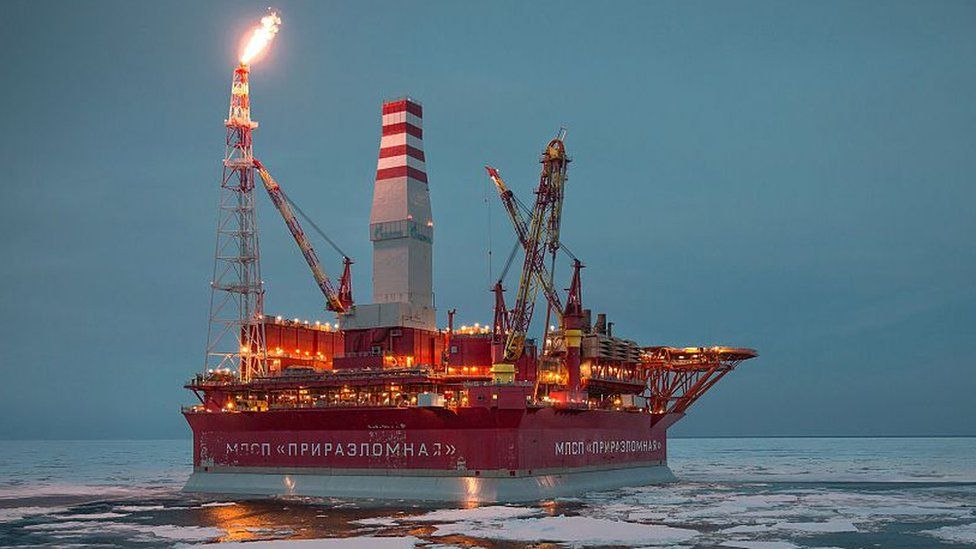A "real embargo" on Russian energy by Western countries could stop war in Ukraine, President Putin's former chief economic adviser has suggested.
Dr Andrei Illarionov said Russia "did not take seriously" other countries' threats to reduce their energy usage.
Despite trying to reduce its reliance on Russian sources, Europe is continuing to buy oil and gas.
Last year, soaring prices meant oil and gas revenues accounted for 36% of Russia's government spending.
Much of that income comes from the European Union, which imports about 40% of its gas and 27% of its oil from Russia.
This week, its top diplomat Josep Borrell said "a billion [euros] is what we pay Putin every day for the energy he supplies us".
Dr Illarionov said if Western countries "would try to implement a real embargo on oil and gas exports from Russia... I would bet that probably within a month or two, Russian military operations in Ukraine, probably will be ceased, will be stopped".
"It's one of the very effective instruments still in the possession of the Western countries," he added.
While the oil and gas trade has continued during the conflict, widespread sanctions mean that a lot of other economic activity has stopped, many foreign companies have pulled out and exports have been disrupted.
One recent survey by Russia's own central bank even forecasts the economy will shrink by 8% this year, while the International Institute of Finance says it could fall by as much as 15%.
Dr Illarionov suggested that President Putin was prepared to endure a hit to the economy that shows where his priorities lie.
"His territorial ambitions, his imperial ambitions, are much more important than anything else, including the livelihood of the Russian population and of the financial situation in the country... even the financial state of the his government," he said.
Jobs under threat
Last week, amid tensions with Europe over how gas would be paid for, President Putin said that "key indicators" of the health of the Russian economy include the "creation of jobs, the reduction of poverty and inequality, the improvement of the quality of life of people, the availability of goods and services".
World Bank figures suggest that almost 20 million Russians live in poverty.
President Putin has, in recent years, pledged to halve that number.
Now Dr Illarionov said "we'll see probably doubling the number of those people, maybe even tripling" as the economy struggles.
The Moscow-based think tank, the Centre for Strategic Research, estimated two million jobs could be lost this year as the unemployment rate rises from a record low.
Those concerns are shared by Vladimir Milov, who is a former Russian deputy energy minister, but is now part of Alexei Navalny's Russia of the Future opposition party.
"Many people are concerned about losing their jobs, I think it's just that the majority does not really realise the severity of the economic situation," he said.
Inflation, which has already risen to 15.7% because of the war, means people might stop spending money on things such as gyms and meals in restaurants and "that's bad news for a lot of small businesses", said Mr Milov.
Some basic food items such as sugar, onions and cabbages have risen in price by more than 40% since the start of this year.
Mr Milov said any noticeable falls in living standards would help his party's cause as an opposition.
"We have been explaining to people all along [that] Putin's policy would lead Russia into a catastrophe, including a complete social and economic catastrophe, including [a] deterioration of living standards that we haven't seen in decades," he said.
"I have to say that comes at an extremely high price. We would prefer not to see what is happening today."
He added: "But I would say [that within a] few months [of] real deep economic trouble, that we haven't seen in 30 years, it will change the mood of the society. More people will start to speak out loudly."
President Putin's former adviser Dr Andrei Illarionov said a change of government is inevitable "sooner or later".
He said "it is absolutely impossible to have any positive future for Russia, with the current political regime".
Under President Putin, he suggested, "there is no way that country might be integrated back into the international relations, in the world economy".
https://www.bbc.com/news/business-61040424

